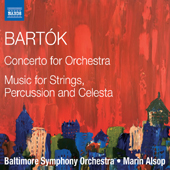
ESSENTIAL RECORDINGS

Béla Bartók's Concerto for Orchestra, one of his greatest works, was written in the United States after
the composer was forced to flee Hungary during World War II. It is not only a brilliant display vehicle for each instrumental section but a work of
considerable structural ingenuity that unites classical forms and sonorities with the pungency of folk rhythms and harmonies. Music for
Strings, Percussion and Celesta explores darker moods through a score of marvellously poised symmetry. {NAXOS}
In order for musical works as viscerally potent and emotionally charged as these two iconic 20th century masterpieces to "click" with the listener, not
only does the conductor have to convey their extra-musical content to the orchestral musicians, but they in turn have to transfer those emotions back
into their playing, and perform as if they mean it. The composer's anima lies behind the notes printed on the score, and it's up to the
musicians to apply their skills and expose it, or otherwise deliver a lifeless interpretation. And that is something all the Baltimore Symphony Orchestra
members do really well, from the trepidatious opening of the Concerto for Orchestra to the energetic final chord of
the Music for Strings, Percussion and Celesta. And I'm not sure if it's because of this orchestra, but it seems to me
that the "American" influenced passages, like the brass choir at the 3:00 mark of the second movement, or that strange fugue at the 4:00 mark of the last movement of the Concerto, sound even more American
in this recording.
Conductor Marin Alsop certainly knows her way around Béla Bartók, having already recorded fine accounts of The Wooden
Prince and The Miraculous Mandarin (mind you with a different orchestra). She certainly seems to capture the dark humour and
tragic aspects of this music well, and what she lacks in sheer speed during the final Presto of the Concerto, she makes up for with plenty
of energy. My only qualm about her delivery, is that it's a bit too fluid. Bartók is angular and rough around the edges, and suffers from too much polish.
Her interpretation lacks Reiner's edge or Solti's Hungarian authenticity. But as far as newcomers are to these powerful works, she is certainly up there
with the best, and the full-bodied Naxos sound recording doesn't hurt one bit.
Jean-Yves Duperron - June 2012